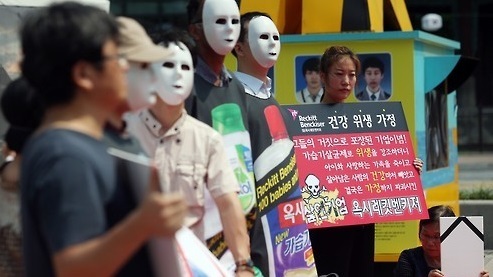Disinfectant-maker accused of skipping toxicity test
By Kim Da-solPublished : March 15, 2016 - 15:47
Oxy Reckitt Benckiser, the manufacturer of the toxic humidifier disinfectant blamed for the loss of over 140 lives, allegedly skipped toxicity tests on the product in question, local media reported Tuesday.
According to news reports, the special probe team of the Seoul Central District Prosecutor’s Office found that the disinfectant-maker intentionally did away with some toxicity tests on its humidifier disinfectant since 2001. This was when the firm started to add PHMG in their product, one of 16 restricted chemicals, according to the Environment Ministry.
According to news reports, the special probe team of the Seoul Central District Prosecutor’s Office found that the disinfectant-maker intentionally did away with some toxicity tests on its humidifier disinfectant since 2001. This was when the firm started to add PHMG in their product, one of 16 restricted chemicals, according to the Environment Ministry.

In 2011, local household manufacturer Oxy was acquired by U.K. household product firm Reckitt Benckiser. After it became Oxy Reckitt Benckiser, well-known products such as laundry bleach Oxyclean, detergent Powerclean, and dehumidifier Thirsty Hippo were widely popular among local consumers.
An employee from Oxy was quoted as saying: “We had planned the toxicity test on animals from the beginning, but we were no longer responsible for such tests since Oxy was merged by Reckitt Benckiser.”
An Oxy Reckitt Benckiser official was also quoted as saying that they “were already done with safety evaluations over all products before the M&A.”
The probe team said it would summon the heads of Oxy and Oxy Reckitt Benckiser to question why tests, such as inhalation or skin toxicity checks, were skipped when the chemicals used in the humidifier disinfectant were changed.
Both Oxy and Oxy Reckitt Benckiser were unavailable when The Korea Herald tried to reach them. The prosecution would not confirm or deny the news reports.
On Tuesday, a group of toxic humidifier disinfectant victims said that the ministry-run Korea Environmental Industry and Technology Institute had sent a notification letter to them, allegedly informing them that the victims’ right to claim damages against the humidifier disinfectant firm would soon expire.
The victims said that “the letter was threatening us to make a settlement before the statute of limitation ends.”
“The ministry or any of the related institutions never reached out to us about the development or future plans to make compensation. It is upsetting that we received this kind of letter, forcing us to end this fight,” one of the victims was quoted as saying by local media.
The ministry denied this and claimed that the letter had “no intention of forcing victims to make settlement on the issue.”
“It was just a simple reminder for victims to not miss the lawsuit case,” said the ministry in a statement.
By Kim Da-sol (ddd@heraldcorp.com)
An employee from Oxy was quoted as saying: “We had planned the toxicity test on animals from the beginning, but we were no longer responsible for such tests since Oxy was merged by Reckitt Benckiser.”
An Oxy Reckitt Benckiser official was also quoted as saying that they “were already done with safety evaluations over all products before the M&A.”
The probe team said it would summon the heads of Oxy and Oxy Reckitt Benckiser to question why tests, such as inhalation or skin toxicity checks, were skipped when the chemicals used in the humidifier disinfectant were changed.
Both Oxy and Oxy Reckitt Benckiser were unavailable when The Korea Herald tried to reach them. The prosecution would not confirm or deny the news reports.
On Tuesday, a group of toxic humidifier disinfectant victims said that the ministry-run Korea Environmental Industry and Technology Institute had sent a notification letter to them, allegedly informing them that the victims’ right to claim damages against the humidifier disinfectant firm would soon expire.
The victims said that “the letter was threatening us to make a settlement before the statute of limitation ends.”
“The ministry or any of the related institutions never reached out to us about the development or future plans to make compensation. It is upsetting that we received this kind of letter, forcing us to end this fight,” one of the victims was quoted as saying by local media.
The ministry denied this and claimed that the letter had “no intention of forcing victims to make settlement on the issue.”
“It was just a simple reminder for victims to not miss the lawsuit case,” said the ministry in a statement.
By Kim Da-sol (ddd@heraldcorp.com)










![[Today’s K-pop] BTS pop-up event to come to Seoul](http://res.heraldm.com/phpwas/restmb_idxmake.php?idx=644&simg=/content/image/2024/04/17/20240417050734_0.jpg&u=)






![[KH Explains] Hyundai's full hybrid edge to pay off amid slow transition to pure EVs](http://res.heraldm.com/phpwas/restmb_idxmake.php?idx=652&simg=/content/image/2024/04/18/20240418050645_0.jpg&u=20240419100350)

